| Srl | Item |
| 1 |
ID:
178846
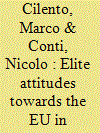

|
|
|
|
|
| Summary/Abstract |
The EU integration process is commonly recognised as a top-down initiative coordinated by elites. Do the differentiated patterns of EU politicisation across countries create a demarcation between two regions, namely Western Europe and Central and Eastern Europe? Through the analysis of data obtained by a standardised survey questionnaire submitted to a representative sample of national political elites in ten countries, we show that elite attitudes are uneven across countries and contingent on different issues. Although the distance between elites in the two regions is significant, elite attitudes do not necessarily qualify as irreducibly Eurosceptic in Central and Eastern Europe.
|
|
|
|
|
|
|
|
|
|
|
|
|
|
|
|
| 2 |
ID:
178848
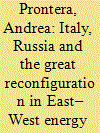

|
|
|
|
|
| Summary/Abstract |
Italy is the second largest market for Russian gas in the EU, and Italy–Russia energy relations stretch back to the Cold War period. By developing an original framework for the study of the politics of producer–consumer cooperation based on an international political economy approach and the analytical concept of forms of state, this article examines the origins, evolution and current features of Italy–Russia dyadic energy relations. This analysis, in turn, offers an important contribution to the study of EU–Russia relations and sheds light on the reconfiguration of East–West gas interdependence within the context of the integration and liberalisation of the EU energy sector.
|
|
|
|
|
|
|
|
|
|
|
|
|
|
|
|
| 3 |
ID:
178853
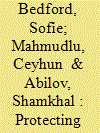

|
|
|
|
|
| Summary/Abstract |
The article contributes to a better understanding of ‘Traditional Islam’ (TI), a state-led project in Azerbaijan to establish an alternative narrative promoting a specific local understanding of Islam that builds on its non-political, non-sectarian and national features to prevent ‘non-traditional’ religious variants from gaining popular traction. The phenomenon has not appeared in a vacuum. First, its features and functions stem from Soviet-era anti-religious and nationalities policies. Second, many aspects of TI resemble counter-radicalisation initiatives worldwide. Finally, while introduced as a means of blocking radicalisation in order to protect Azerbaijan’s national identity as a secular state, Traditional Islam in fact works to extend state control over the religious domain and thus to prevent the development of any religiously grounded dissent against the authoritarian regime.
|
|
|
|
|
|
|
|
|
|
|
|
|
|
|
|
| 4 |
ID:
178850
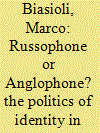

|
|
|
|
|
| Summary/Abstract |
This article reveals the connections between Russian nationalism and Russian indie music. It argues that indie trendsetters’ views on music converge, perhaps unconsciously, with the state’s promotion of an assertive nationalism and its cultural implications, following the same politically inspired defensive mechanisms. In support of this argument, the article analyses the reaction by some music intermediaries in public discourse in the 2010s to the popularity of Russian Anglophone bands in local settings. The article thus reconceptualises the relationship between indi and politics in Russia since the Pussy Riot affair in 2012.
|
|
|
|
|
|
|
|
|
|
|
|
|
|
|
|
| 5 |
ID:
178847
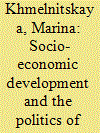

|
|
|
|
|
| Summary/Abstract |
Russia’s 2018 presidential election campaign was accompanied by a new round of strategies of socio-economic development. This article analyses these documents from the perspective of the ‘politics of expertise’ defining the relations between the political regime and policy experts. The analysis draws on authoritarian politics and public policy literatures. The article argues that a ‘hollow paradigm’ approach to the politics of expertise has emerged in response to the dilemmas of authoritarian governance. While the substantive, ideational element of this paradigm is vague, its procedural, expert community-binding element is strong. The analysis contributes to the understanding of the politics surrounding the writing of strategic plans, the role of policy ideas and state–society relations in contemporary Russia.
|
|
|
|
|
|
|
|
|
|
|
|
|
|
|
|
| 6 |
ID:
178856


|
|
|
|
|
| Summary/Abstract |
This article evaluates the relationships among state-framed and alternatively territorialised narratives of identity and belonging in Kazakhstan. Using survey data from 2017 and 2018, we argue that collective identity among Kazakhstan’s citizens is negotiated not just in terms of balancing ethnic and civic forms of state-centric national belonging, but also through varied forms and scales of attachment to place. Our analysis shows how collective identity in Kazakhstan draws on both traditional state-framed models of territorialisation and vernacular conceptions of homeland. We find significant variation in attachment among different ethnic and social groups within Kazakhstan.
|
|
|
|
|
|
|
|
|
|
|
|
|
|
|
|
| 7 |
ID:
178858
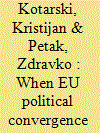

|
|
|
|
|
| Summary/Abstract |
The unifying theme of our study is that democratic backsliding in the post-socialist new EU member states occurs against the backdrop of existing or emerging cases of state capture. Following an extensive overview of corporate and party state capture, we update and develop new empirical indicators for tracing each phenomenon. Our claim is that while both varieties of capture have negative effects on democratic legitimacy, there are striking differences in their modus operandi. In that regard we provide two critical case studies, Croatia and the Czech Republic.
|
|
|
|
|
|
|
|
|
|
|
|
|
|
|
|